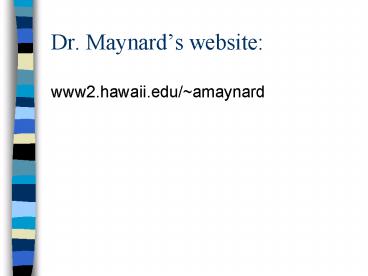Dr' Maynards website: - PowerPoint PPT Presentation
1 / 14
Title:
Dr' Maynards website:
Description:
Nature vs. nurture. Active vs. passive child. Continuity vs. discontinuity. 4. Methods ... with a group of children: Abused vs. nonabused (3 sessions, 10 mins. ... – PowerPoint PPT presentation
Number of Views:29
Avg rating:3.0/5.0
Title: Dr' Maynards website:
1
Dr. Maynards website
- www2.hawaii.edu/amaynard
2
Social Development
- What is social development? And why is it
important? - Socialization
- 3 controversies in child development
- Methods
3
1. What is social development?
- What kinds of things are social?
- What about for infants?
- Young children?
- Older children?
- Adolescents?
4
1b. Why is social development important?
5
2. What is socialization?
- Acquisition of
- Beliefs
- Values
- Behaviors
- Who socializes children?
- - Parents, peers, school teachers, clergy, etc.
- - Institutions
6
2. What is socialization?
- Socialization has three important functions
- Regulates behavior
- Promotes individual growth
- Perpetuates social order
7
3. Three controversies in child development
- Nature vs. nurture
- Active vs. passive child
- Continuity vs. discontinuity
8
(No Transcript)
9
4. Methods
- Interviews
- Structured, semi-structured, clinical (usu.
driven by a hypothesis) - Questionnaires
- Observations
- Naturalistic observations
- Time-sampling
- Case studies
- Ethnography
10
Time sampling with a group of children Abused
vs. nonabused (3 sessions, 10 mins., 3 different
days)
11
Ethnography
- Rich description of cultural beliefs, values, and
traditions. - Investigator often spends years in a field site.
12
More methodsExperimental and correlational
designs
- Experimental designs
- Independent variable
- Treatment we expose subjects to (e.g., show them
TV), or some attribute of participants (e.g.,
age, gender) - Dependent variable
- The Data
- Reactions, response, performance, etc.
13
The quasi-experiment
- natural experiment
- We can study the impact of natural events that
would be difficult to simulate in an experiment.
- E.g.,
- a group of children in impoverished institutions
- a group of children who have gone to school
compared with those who have not
14
Correlations
- Are these variables meaningfully related?
- Of coursenot necessarily causally related.































